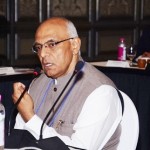Aashna Agarwal (GH): Your job is to build India’s skills. How has the progress been so far and what are the challenges today?
K.P. Krishnan (K.P.K.): No one can build India’s skills, she will build her own. Governments, typically, do not build skills; they enable it. We want to address the hugely inadequate skill capacity in India; we need ten times the magnitude of what we have today. The ‘Skill India’ mission, which was launched in 2014, has a clear set of three objectives:
- increasing our skilling capacity. Evidence shows that what we have currently doesn’t produce the quality or employability required for a modern/modernising economy, like India;
- enhancing quality and employability; and
- skills acquisition, which is a much deeper challenge because in developing countries/ societies like ours, it is not very aspirational. How does one make it aspirational?
The answers are intuitively obvious. The difficulty is: given the impatience of youth, and rightly, of politics, how do we do all this with speed and in an inclusive manner? This is, broadly, a summary of the skills challenge.
The backbone of any skilling programme is the formal vocational education and training system, which, in India, we call the Industrial Training Institutes (ITI). We currently produce something like 16-20 lakh certificate holders per annum: we probably require six or seven times that number. We are increasing ITI capacity massively. But we have also rewritten all the affiliation accreditation norms for it so that we produce quality institutes. This will take time.
In the meanwhile, we have created a very large ecosystem of short-duration skilling programmes which will partly meet the gap in quality and employability. Our primary thrust is employer connect in defining skilling needs. So the sector skill councils, led by industry and populated with industry representatives, decide the core content, curriculum, and method of training and assessment. We are already seeing an increase in employability. Long-term improvement in quality will come with regulation and self-grading — and exercises in these areas have also been launched.
As for the aspirational part, typically, if vocational education becomes a dead end and if the child does not have any opportunity to go beyond it, skills will not be aspirational. Likewise, if the skilled employee, does not get a higher wage, there is likely to be no aspiration. Our attempt, in a nutshell, is to address both: educational pathways and bringing about a skill-wage premium.
GH: So your mentorship programme for promoting entrepreneurship in rural areas comes under which of these three challenges?
K.P.K: A large part of India’s skilled workforce does not actually enter wage employment because that is how the Indian economy is structured and what the organisational pattern of industry services is. So, many end up in what is euphemistically called ‘self-employment’, which, very often, consists hugely of under-employed people. So our attempt in the entrepreneurship module is to convert these people into actual entrepreneurs who, besides employing themselves, can perhaps employ one more person with skills beyond the domain ones.
GH: With the rise of the self-employed workforce and on-demand start-ups, how can India design a regulatory work system that is conducive to a flexible and performance-driven environment?
K.P.K.: That is a complex question because there are huge issues relating to labour legislations which cut across the government of India and the states. But to focus on one aspect which is within my broad domain: young start-ups require skills that need to be constantly evolving and changing. For example, when recruiting a fitter or mechanic, a person with some foundational skills (may suffice), but as the start- up grows, the skill itself may need to undergo a change. So we are now focusing not so much on great domain knowledge, but the ability to learn continuously, soft skills, foundational skills and digital learning, things which will enable a worker and entrepreneur to evolve as times change.
GH: The Indian informal economy employs 90% of our workforce. How can we design banking, insurance and healthcare products to support its workers?
K.P.K.: We have designed many such products. The question is: how do we scale up their implementation and adaptation? For instance, the National Pension System (NPS), which was introduced in 2004, is a pension system based on one’s contribution. It’s not a defined benefit system, but a defined contribution system. It does not mandate any minimum sums or an employer contribution necessarily. For instance, if you want to join the NPS and contribute Rs 200 today, but tomorrow, you work for a larger firm and want to contribute Rs 2,000 a month and your employer wants to contribute another Rs 2,000, it is permissible. It is a flexible, but regulated, pension system, allowing for very small-ticket contributions.
Similarly, the government of India’s entire thrust towards financial inclusion is, primarily, banking the unbanked, securing the unsecured and funding the unfunded. The sad part is that people don’t know enough about the kind of products that are available in the market. So the challenge is not in creating products, but ensuring that they are actually made available at the delivery points where a bulk of India’s unorganised labour force resides.
K.P. Krishnan Secretary, Ministry of Skill Development and Entrepreneurship & Chairman, National Skill Development Agency (NSDA), Government of India.
Aashna Agarwal is Content Coordinator at Gateway House.
This interview was exclusively conducted for Gateway House: Indian Council on Global Relations. You can read more exclusive content here.
For permission to republish, please contact outreach@gatewayhouse.in.
© Copyright 2018 Gateway House: Indian Council on Global Relations. All rights reserved. Any unauthorized copying or reproduction is strictly prohibited.


